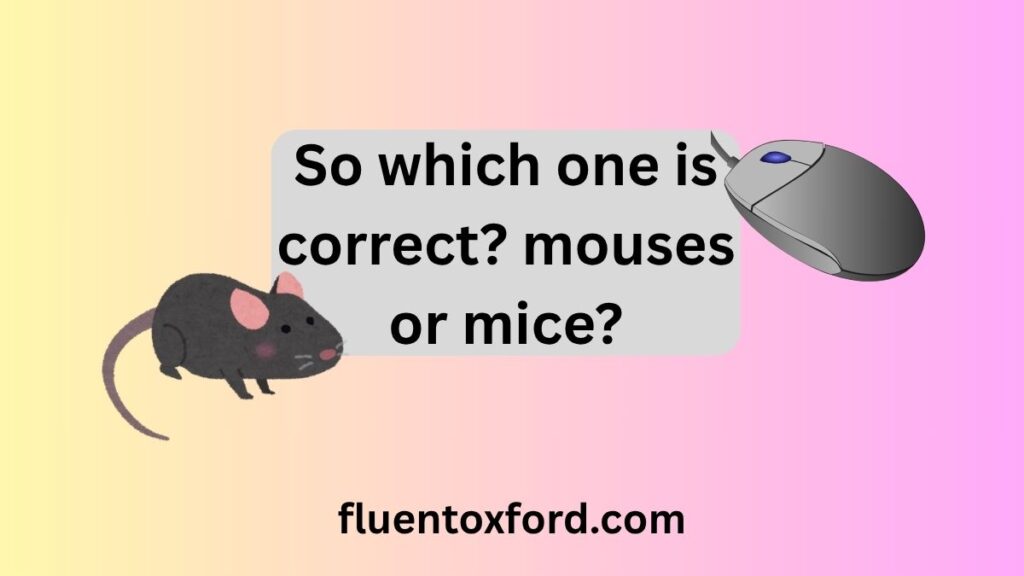The phrase “Mouses vs. Mice: What’s the Correct Plural?” refers to the grammatical and contextual dilemma surrounding the pluralization of the word mouse. Traditionally, “mice” is the irregular plural form of “mouse” when referring to the small rodent. However, in the realm of technology, particularly when talking about computer accessories, “mouses” has gradually gained informal acceptance. This contrast between standard linguistic rules and modern usage sparks an interesting exploration of how language adapts to new contexts.
Language is a living, evolving system—and nothing demonstrates this better than the debate over mouses vs. mice. As technology advances and our vocabulary grows to accommodate it, words often take on new meanings and forms. This shift blurs the lines between what’s grammatically correct and what’s commonly accepted. It’s this very evolution that keeps language dynamic and captivating.
Understanding the difference in usage between mouses vs mice: what’s the correct plural is more than a grammar lesson—it’s a reflection of how language adjusts to cultural and technological change. Whether you’re writing professionally, studying linguistics, or simply curious about English quirks, exploring the correct plural of mouse offers a fascinating glimpse into the blend of tradition and innovation in modern English.
Why This Question Matters
At first glance, this might seem like a niche grammar rule, but the implications stretch further. Tech professionals, teachers, content writers, and even casual speakers come across the plural of mouse more often than you’d expect. Understanding the correct plural form helps with clarity in writing, speaking, and professional communication.
Two Worlds, Two Plurals: Animal vs. Device
Let’s get this clear right off the bat:
- If you’re talking about the animal mouse, the plural is always mice.
- If you’re referring to the computer mouse, it can be mouses or mice, depending on the context.
This is a perfect case of disambiguation—where two meanings of the same word evolve with different uses.
What Does “Mouse” Actually Mean? A Dual Definition
The word mouse holds two very different meanings:
1. The Animal Mouse
- Small rodent, often found in fields, homes, or labs.
- Scientific classification: Mus musculus
- Plural: mice
2. The Computer Mouse
- A handheld computer device used to control on-screen movement.
- Invented in the 1960s by Douglas Engelbart.
- Plural: mouses (industry-preferred) or mice (colloquial usage)
Both meanings stem from a single word but have split over time, especially due to technological advancements.
Etymology Breakdown: Where Did “Mouse” Come From?
Understanding the morphology of a word helps clarify its correct plural.
- Old English: mūs (singular), mȳs (plural)
- Proto-Germanic: mūs (same form)
- Proto-Indo-European root: muh- meaning “stealer” or “thief”
The irregular plural mice developed as part of a broader pattern seen in English with words like:
- Louse → Lice
- Goose → Geese
- Man → Men
These are irregular nouns, which break from the usual “-s” or “-es” pluralization rule due to ancient phonetic shifts.
The term computer mouse was coined because early devices resembled a small rodent with a tail (the cord). The tech world borrowed the word but didn’t immediately assign a standard plural.
So which one is correct? mouses or mice?

Here’s the answer you came for.
Animal Mouse → Mice (Always)
- This follows traditional inflection patterns of irregular plurals.
- Example: “We saw three mice in the barn.”
Computer Mouse → Mouses or Mice
Both are technically correct, but context matters:
| Usage | Preferred Plural |
| Formal Writing | Mouses |
| Informal Speech | Mice |
| Industry Manuals | Mouses |
| Academic Context | Mouses |
According to linguistic experts and tech writers, mouses is the recommended plural in technical contexts to avoid ambiguity.
“In computing, ‘mouses’ is clearer and avoids confusion with rodents.“
— Oxford University Press
Style Guide Preferences: What Do the Experts Say?
When in doubt, turn to the style guides. Here’s where things stand:
| Style Guide | Plural of Computer Mouse | Comments |
| AP Stylebook | Mice or Mouses | No strict rule, advises clarity |
| Chicago Manual | Mouses | Avoids confusion with animals |
| Oxford Guide | Mouses | Technically accurate for tech context |
| Microsoft Docs | Mouses | Company-wide internal standard |
Clearly, mouses is winning in professional usage—especially in documentation and interface design.
Plural in the Tech Industry: Real-World Usage
Let’s examine how top tech companies and users handle this dilemma.
Case Study: Microsoft
- The Microsoft internal style guide prefers mouses.
- Used in official support docs:
“You can connect up to three Bluetooth mouses to your device.”
Case Study: Apple
- Product pages sometimes avoid the plural entirely by using terms like “mouse models.”
- However, in support forums, users frequently use mice informally.
Programming Documentation
In repositories like GitHub, both forms appear, but mouses is used more frequently in official documentation to maintain precision.
Sentence Examples: Mice vs Mouses in Context

Seeing these terms in action helps make sense of when to use what.
Animal Mouse Examples
- “The mice scattered as the lights turned on.”
- “A cat was chasing a group of mice in the alley.”
Computer Mouse Examples
- “I keep several mouses on hand for testing different systems.”
- “Some people call them mice, but in the lab, we say ‘mouses.”
When you use mice in sentences, be sure your audience won’t confuse it with the animal.
Rat vs Mouse: Quick Clarification
Many confuse rat and mouse in biological discussions. Here’s a quick distinction:
| Feature | Mouse | Rat |
| Size | Smaller (2-4 inches body) | Larger (6-9 inches body) |
| Tail | Long, thin, hairy | Shorter, thicker, scaly |
| Behavior | Timid, fast | Bold, exploratory |
| Habitat | Indoors, fields | Sewers, basements |
Remember, mice are smaller, more elusive, and more common indoors. Not interchangeable with rats.
Examples of Using “Mouse,” “Mice,” and “Mouses” in Sentences
Using “Mouse” in Sentences:
- The cat chased the mouse around the kitchen.
- I bought a new wireless mouse for my laptop.
- A mouse squeaked and ran under the couch.
- She saw a tiny mouse hiding in the corner.
- He clicked the mouse to open the document.
- The lab technician handled the mouse carefully.
- A mouse chewed through the cereal box.
- This mouse fits perfectly in my hand.
Examples of “Mice” in Sentences:
- There were three mice hiding behind the fridge.
- Mice are often used in scientific research.
- The children screamed when they saw the mice.
- Mice can squeeze through very small holes.
- Several mice escaped from the cage.
- The farmer set traps to catch the mice.
- Mice usually come out at night.
- The attic was full of dust and mice.
Using “Mouses” in Sentences (Technology Context):
- We connected several computer mouses to the system.
- The store sells both wired and wireless mouses.
- Tech support had to replace all the broken mouses.
- These gaming mouses have customizable buttons.
- She tested different mouses before choosing one.
- The office ordered new mouses for the staff.
- They cleaned all the old mouses before donating them.
- Mouses are important tools for graphic designers.
Final Word: Context Is King

So, what’s the right way to pluralize mouse? Here’s your takeaway:
- Talking about rodents? Always use mice.
- Talking about tech devices?
- Use mouses in technical or formal writing.
- Use mice in casual or spoken settings, but be aware of potential confusion.
If clarity is your goal—and it always should be—mouses is the correct plural form in professional tech use.
Quick Reference Table: Mouse vs. Mice
| Singular | Plural (Animal) | Plural (Computer) |
| Mouse | Mice | Mouses / Mice |
Bonus: Fun Facts About the Word “Mouse”
- First use in computing: 1965 by Douglas Engelbart
- Original mouse: A wooden shell with two wheels
- Most expensive computer mouse: A luxury Swiss mouse encrusted with diamonds, priced at $24,180
- Fastest mice (animal): Can run up to 8 mph
Conclusion
In the end, Mouses vs. Mice: What’s the Correct Plural depends on the context. If you are talking about animals, “mice” is the right choice. But when speaking about computer devices, many people now say “mouses,” especially in tech settings. While “mice” is still correct for both, using “mouses” for computers is becoming more common.
Language is always changing, and Mouses vs. Mice: What’s the Correct Plural shows how new meanings can shape grammar rules. Whether you’re writing, teaching, or just curious, knowing the difference helps you choose the right word. It’s a simple example of how modern life changes how we use language every day.
FAQs
1. What is the correct plural of “computer mouse in 2025?
👉 “Mouses” is the preferred plural in technical and professional contexts, though “mice” is still commonly used informally.
2. Do major tech companies like Microsoft or Apple use “mouses”?
👉 Yes, Microsoft uses “mouses” in internal documentation. Apple avoids the plural but leans toward user-friendly phrasing like “mouse models.”
3. Is it wrong to use “mice” when referring to computer devices?
👉 Not wrong, but it can cause confusion with the animal mouse; “mouses” is clearer in tech writing.
4. Are there any official grammar rules for the plural of “computer mouse?
👉 Most style guides (Chicago, Oxford, Microsoft) accept “mouses” for devices to avoid ambiguity, but grammar rules allow flexibility due to informal acceptance of both.
5. Which is more commonly used in 2025: “mouses” or “mice” for computers?
👉 “Mouses” is gaining ground in professional settings and documentation, while “mice” remains common in speech and casual use. Both are in active use globally.

As an admin at Fluent Oxford, Maida Queen is the driving force behind our vibrant learning community. With a deep passion for English language education, she ensures that our platform remains a dynamic, engaging, and supportive space for learners worldwide.
Maida expertly manages content, assists users with their grammar and fluency queries, and fosters an interactive environment where learning feels effortless and enjoyable. Whether you need guidance, motivation, or just a friendly face in the Fluent Oxford community, Maida is always there to help you reach your English language goals.








